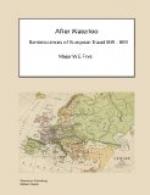The Louvre has been stripped of the principal statues and pictures which have been sent back to the places from whence they were taken, to the great mortification of the Parisians, most of whom would have consented to the cession of Alsace and Lorraine and half of France to boot on condition of keeping the statues and pictures. The English Bureaux are preparing to leave Paris and the troops will soon follow; a new French army is organizing and several Swiss battalions are raised. It is generally supposed that by the end of December France, with the exception of the fortresses and districts to be occupied by the Allied Powers, will be freed from the pressure of foreign troops.
The Chamber of Peers is occupied with the trial of Marshall Ney, the Conseil de Guerre, which was ordered to assemble for that purpose having declared itself incompetent. The friends of Ney advised him to claim the protection of the 12th Article of the Capitulation of Paris, and Madame Ney, it is said, applied both to the Duke of Wellington and to the Emperor of Russia; both ungenerously refused; to the former Nature has not given a heart with much sensibility, and the latter bears a petty spite against Ney on account of his title, Prince de la Moskowa. It is pretty generally anticipated that poor Ney will be condemned and executed; for tho’ at the representation of Cinna a few nights ago, at the Theatre Francais, the allusions to clemency were loudly caught hold of and applauded by the audience, yet I suspect Louis XVIII is by no means of a relenting nature, and that he is as little inclined to pardon political trespasses as his ancestor Louis IX was disposed to pardon those against religion; for, according to Gibbon, his recommendation to his followers was: "Si quelqu’un parle contre la foi chretienne dans votre presence, donnez lui l’epee ventre-dedans.”
December 18th.
I met with an emigrant this day at the Palais Royal who was acquainted with my family in London. It was the Vicomte de B*****ye.[58] He had resided some time in England and also in Switzerland. He is an amiable man, but a most incorrigible Ultra. He displayed at once the ideas that prevail among the Ultras, which must render them eternally at variance with the mass of the French nation. In speaking of the state of France, he said: “Je n’ai jamais cesse et jamais je ne cesserai de regarder comme voleurs tous les acquereurs des biens des emigres. Il faudroit, pour le bonheur de la France, qu’elle fut places dans le meme etat ou elle etait avant la Revolution.” He would not listen to my reasons against the possibility of effecting such a plan, even were the plan just and reasonable in itself. I told him that for the emigrants to expect to get back their property was just as absurd as for the descendants of those Saxon families in England, whose ancestors were dispossessed of their estates by William the Conqueror, to think of regaining them, and to call upon the Duke of Northumberland, for instance, as a descendant of a Norman invader, to give up his property as unjustly acquired by his progenitors. We did not hold long converse after this; his ideas and mine diverged too much from each other.




